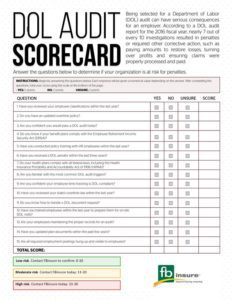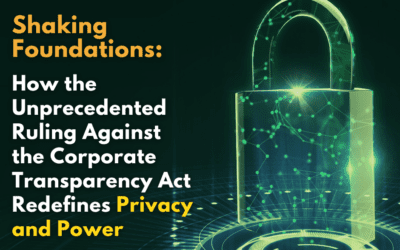The Department of Labor (DOL)’s Employee Benefits Security Administration (EBSA) has the authority to conduct audits on benefits plans that are governed by the Employee Retirement Income Security Act (ERISA). DOL audits often focus on violations of ERISA’s fiduciary obligations and reporting and disclosure requirements.
The DOL may also investigate whether an employee benefit plan complies with ERISA’s protections for plan participants, such as the special enrollment rules or mental health parity requirements. Recently, the DOL has been using its investigative authority to enforce compliance with the Affordable Care Act (ACA).
Penalties for noncompliance and other errors found during an audit can be steep. For example, during the 2013 fiscal year, more than 70 percent of audits resulted in monetary fines or other corrective action. There are several factors that increase or indicate your likelihood of being audited, including the common triggers listed below.
DOL Audit Triggers
A DOL audit can be triggered for a variety of reasons. Some audits can be avoided through careful administrative efforts; other audits are initiated through no fault of your own.
Common triggers for a DOL audit include these preventable causes:
- Participant complaints. If any of your plans’ participants complain to the DOL about potential ERISA violations, your plan will likely be subjected to an audit. For example, according to a DOL audit summary, 775 new investigations in 2013 resulted from participant complaints.
- Incomplete or inconsistent information. The DOL is more likely to investigate a plan that has incomplete answers on the plan’s Form 5500, or if information you report is inconsistent from year to year.
 DOL audits can be triggered by negligence or mistakes on your part, or because your plan falls within one of the areas in which the DOL is focusing its investigative efforts on. Regardless of why you are selected for an audit, you need to be prepared. Here is a checklist to help you stay on top of issues that may trigger an audit. If you have additional questions, contact FBinsure for information on how to avoid DOL triggers.
DOL audits can be triggered by negligence or mistakes on your part, or because your plan falls within one of the areas in which the DOL is focusing its investigative efforts on. Regardless of why you are selected for an audit, you need to be prepared. Here is a checklist to help you stay on top of issues that may trigger an audit. If you have additional questions, contact FBinsure for information on how to avoid DOL triggers.


